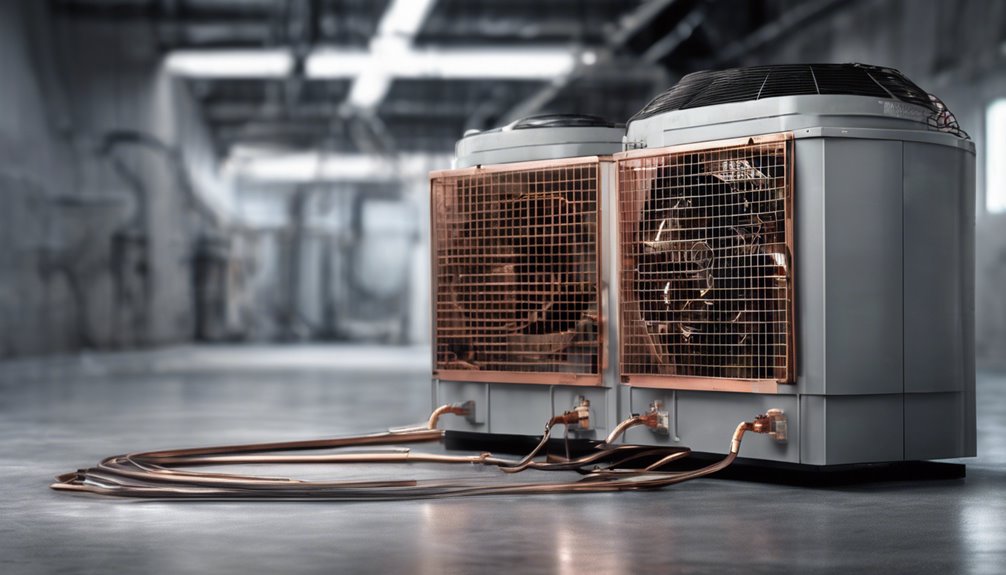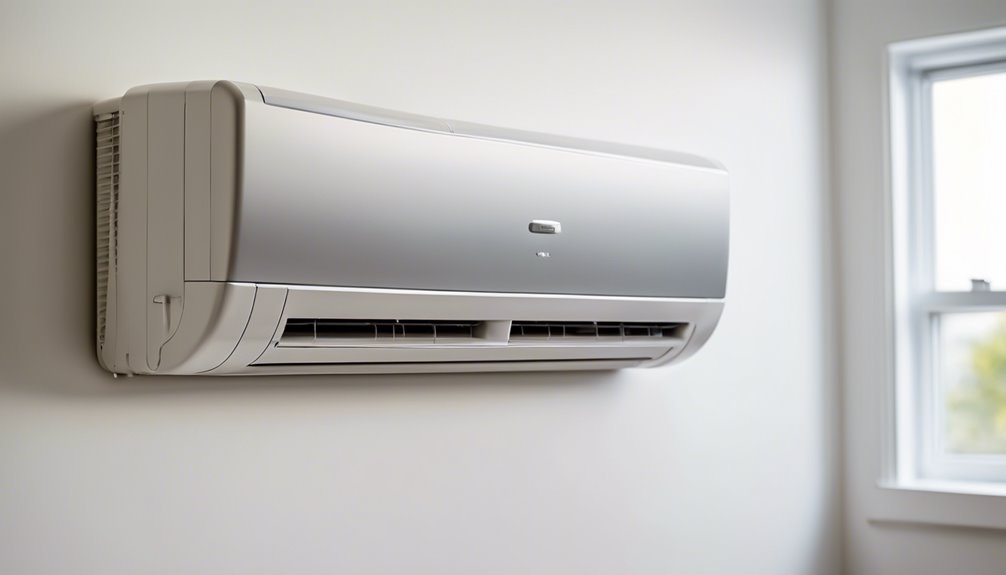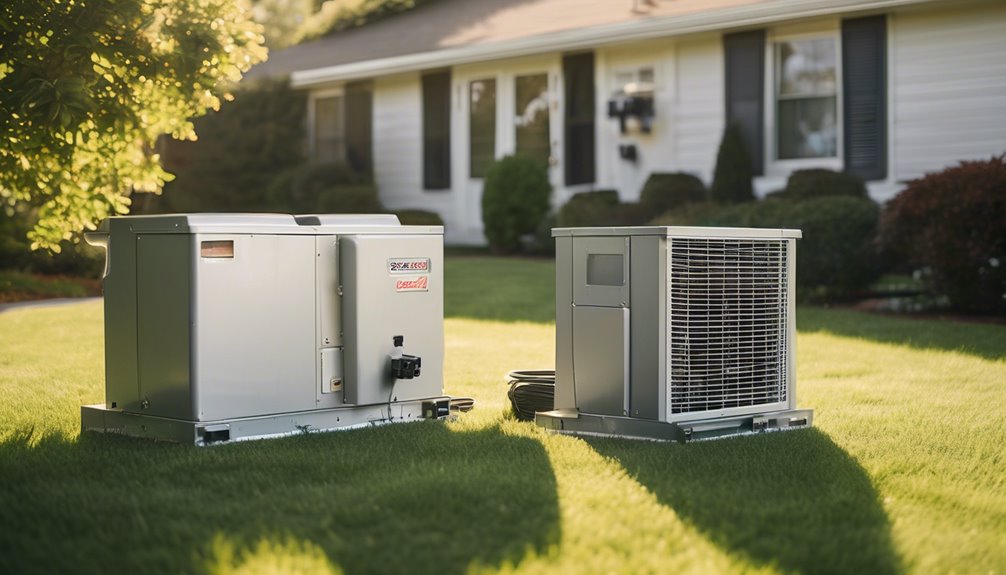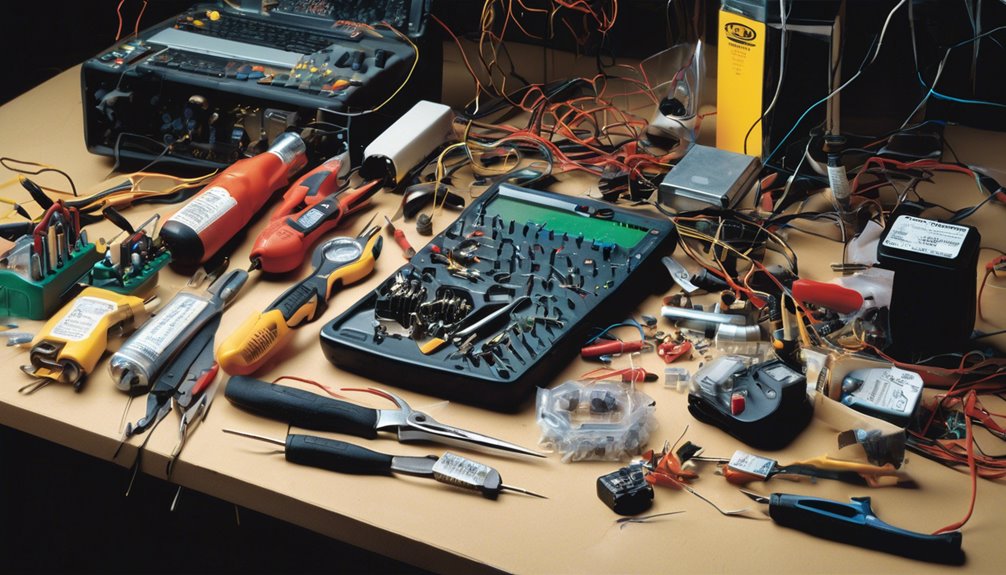Your AC sounds like a jet engine? That's more than just an annoyance – it's often a sign of a deeper issue. Improper air pressure, poor duct design, and worn or damaged parts can all cause the racket. Ignoring it can lead to hearing loss, increased energy bills, and even a shorter AC lifespan. But don't worry, you're about to get to the bottom of it. By exploring the possible causes and DIY fixes, you'll be well on your way to a quieter, more efficient AC – and a healthier, happier you.
Key Takeaways
- Improper air pressure, poor duct design, or unsealed ducts can cause your AC to produce excessive noise, similar to a jet engine.
- Worn or damaged parts, refrigerant leaks, or electrical issues can also contribute to loud AC operation.
- Ignoring the noise can lead to serious consequences, including hearing loss, noise anxiety, and decreased quality of life.
- Identifying the source of the noise is crucial; check for loose screws, gaps in the casing, and fan balance to diagnose the issue.
- If the problem persists or you're unsure about the cause, it's best to call in a professional to prevent further damage or safety risks.
Common Causes of a Loud AC
When your air conditioner kicks in, it's supposed to provide a comforting whoosh of cool air, not a jarring blast of noise.
But what if it's doing the opposite? A loud AC can be frustrating and disruptive.
One common cause is improper air pressure. If the pressure is too high or too low, it can cause the AC to work harder, resulting in increased noise levels.
Another culprit is poor duct design. If the ducts are too small, too large, or have kinks and bends, it can restrict airflow and create noise.
Additionally, if the ducts aren't properly sealed, it can allow noise to escape and amplify.
The Dangers of Ignoring the Noise
Because you've grown accustomed to the hum of your air conditioner, you might be tempted to ignore the unusual noises it's making, but doing so can have serious consequences. Ignoring the noise can lead to health risks, noise anxiety, and even more costly repairs down the line.
| Consequence | Description | Risk Level |
|---|---|---|
| Health Risks | Prolonged exposure to loud noises can cause hearing loss, tinnitus, and cardiovascular disease. | High |
| Noise Anxiety | The constant noise can cause stress, anxiety, and decreased quality of life. | Medium |
| Increased Energy Bills | A malfunctioning AC can increase energy consumption, leading to higher bills. | Low |
| Reduced Lifespan | Ignoring the noise can reduce the lifespan of your AC, requiring earlier replacement. | Medium |
Is It a Loose Screw or Something More?
You've noticed your air conditioner making an unusual noise, and you're wondering if it's just a loose screw or something more serious.
Before you start imagining the worst, take a closer look at the unit's exterior and interior. Check for any loose screws, paying attention to their location on the condenser coils, fan blades, or mounting brackets.
- You're on your hands and knees, peering into the dark recesses of the AC unit, searching for that one stray screw.
- The sound of the AC's hum is muffled, but the rattling noise is still audible, making you anxious to find the source.
- Your hand brushes against the cool metal as you reach for the screwdriver, ready to begin the tightening process.
If you do find a loose screw, the tightening process might be as simple as screwing it back in place.
When to Call in the Professionals
As you've eliminated the possibility of a loose screw, it's time to consider whether the issue lies beyond your DIY expertise. If you're unsure about what's causing the noise or if the problem persists after trying simple fixes, it's likely an emergency situation that requires expert diagnosis. Don't hesitate to call in the professionals if you notice:
| Situation | Action | Why |
|---|---|---|
| AC won't turn on | Call a pro | Safety risk, potential electrical issue |
| Noise is extremely loud | Call a pro | May indicate serious mechanical failure |
| You're unsure about the cause | Call a pro | Expert diagnosis needed to prevent further damage |
In these situations, it's better to err on the side of caution and seek professional help to avoid further damage or safety risks.
DIY Fixes for a Quieter AC
If your AC is still running but making a racket, don't worry – there are several DIY fixes you can try to quiet it down.
Still running but making a racket? Don't sweat, there are DIY fixes to silence your AC without calling in the pros.
Before calling in the professionals, take a closer look at your unit and see if you can identify the source of the noise.
- Check for loose screws or bolts that might be causing the AC to vibrate excessively, and tighten them up.
- Look for any gaps or holes in the casing and seal them with sound-dampening materials like foam or caulk to reduce the noise that escapes.
- Make sure the fan is properly balanced to prevent wobbling, which can create a loud whooshing sound.
Frequently Asked Questions
Can I Use a Sound-Dampening Material to Reduce AC Noise?
You can definitely use sound-dampening materials to reduce the noise. Try placing acoustic panels near the AC unit or wrapping it with soundproofing blankets to absorb the sound waves and minimize the racket.
Will a New AC Unit Be Quieter Than My Old One?
You're wondering if a new AC unit will bring some peace and quiet to your space. The good news is that modern designs often incorporate Whisper technology, which significantly reduces noise levels, so you can expect a quieter operation with a new unit.
Can I Run My AC at Night to Avoid Disturbing Neighbors?
You can run your AC at night to avoid disturbing neighbors by enabling Night mode, which ensures silent operation. This feature reduces fan speed, compressor noise, and overall sound output, allowing you to sleep peacefully while keeping your home cool.
How Often Should I Clean My Ac's Air Filter?
You should clean your AC's air filter every 1-3 months, depending on usage. Dirty coils and neglected filter replacements can lead to poor performance and high energy bills, so stay on top of maintenance to breathe easy and save money!
Does a Quieter AC Unit Always Mean It's More Efficient?
You wonder if a quieter AC unit always means it's more efficient. Not necessarily; while a quieter unit might imply better sound quality, it's energy ratings that truly determine efficiency, so be sure to check those when making a purchase.
Conclusion
So, you've figured out why your AC sounds like a jet engine and what to do about it. Now it's time to take action. If you're handy, try those DIY fixes to quiet things down. But if the problem persists, don't hesitate to call in a pro. Remember, a loud AC can be a sign of a bigger issue, and ignoring it can lead to costly repairs or even safety hazards. Get it fixed, and get back to enjoying your cool, quiet space.



